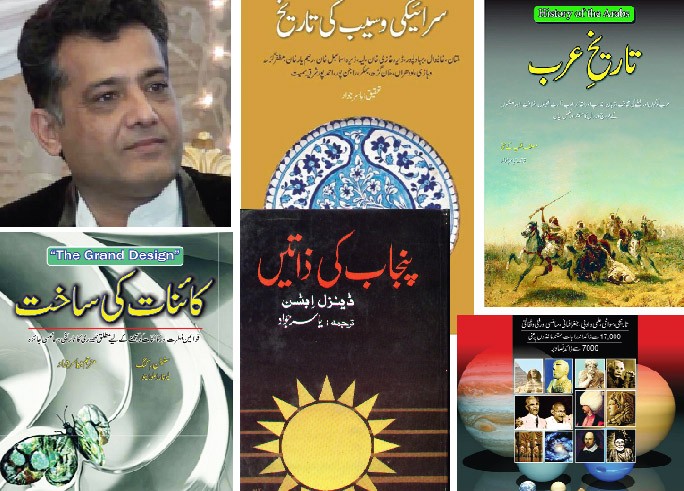
Yasir Javvad is a freelance translator of books who calls it his passion

Entering the study cum office of Yasir Javvad, you can’t help noticing books upon books neatly stacked in wooden racks. There are books on almost all topics under the sun, while most of the space is consumed by fatty tomes like dictionaries and encyclopedias.
In another room, there is a huge pile of books arranged in a pyramid. These are the books Javvad has translated over the past two decades or so, from English into Urdu.
An energetic guy, pushing 40, Javvad says he started "hobnobbing with the left-leaning political workers" in his youth. "They would organise parallel theatre in Lahore." They inspired him to learn the Gurmukhi script of Punjabi and the Hindi Devanagri script. Soon he was translating Punjabi fiction -- from Gurmukhi to Shahmukhi -- for magazines like Lehran. He became the first person to translate the short stories and some novels of the famous Punjabi writer Ajeet Kaur, into Shahmukhi.
During that time, he got the job of a sub editor in an Urdu newspaper, where he would also translate articles written in English language (into Urdu). That was how he was able to sharpen his skills.
After serving at the paper for eight long years, he left the job, in 1999. "I never took up any job after that," he tells TNS, in an exclusive chat. "I decided to devote my time to translating books from English into Urdu. I can safely say I haven’t looked back since."
Javvad admits that there were times when he found it hard to make both ends meet, but he didn’t give up on his passion. Even today, he says, he has to often translate reports and manuals for different NGOs -- "that helps to pay my bills!"
Of the many books he has translated, the ones he holds dear include French existentialist Simone de Beauvoir’s 1949 novel, The Second Sex; Franz Kafka’s play, The Trial; History of God by Karen Armstrong; Histories by Herodotus; Culture and Imperialism by Edward Said; Cosmos by Carl Sagan; and The Renaissance by Will Durant.
His pet subjects are history, psychology, philosophy, and comparative religions. But he has also translated gazetteers of different districts of Punjab, besides compiling a history of the Seraiki region. Similarly, he compiled an Urdu encyclopedia which runs into more than 2,500 pages -- it took him five years to complete it -- and the multi-volume Urdu dictionary, titled Firhang-e-Asfia.
Most often, the publishers commission him books for translation. "They are interested in bestsellers in fiction, history, and biography," he adds.
"Also, at times, I have translated a book on the recommendation of a friend or someone I know."
Talking about the difficulties involved in translations, Javvad says, "I recently translated Alexander Gray’s book, The Socialist Tradition, Moses to Lenin. It was one hard book to translate into Urdu, because of the philosophical context and the kind of terms used. But that’s the challenge!"
Kakfa was another challenging author to translate, and Javvad says that he often felt like quitting it.
Presently, Javvad is working on a book written by Terry Eagleton, a British literary theorist and critic. "It’s another difficult book [to translate]," he says.
He laments the fact that the state-run literary institutions have no interest in the field of translation, "They always excuse themselves by saying there’s a dearth of funds."
He also believes that the publisher of today is more interested in getting self-help books translated. "It’s impossible to survive as a freelance translator if you remain choosy."